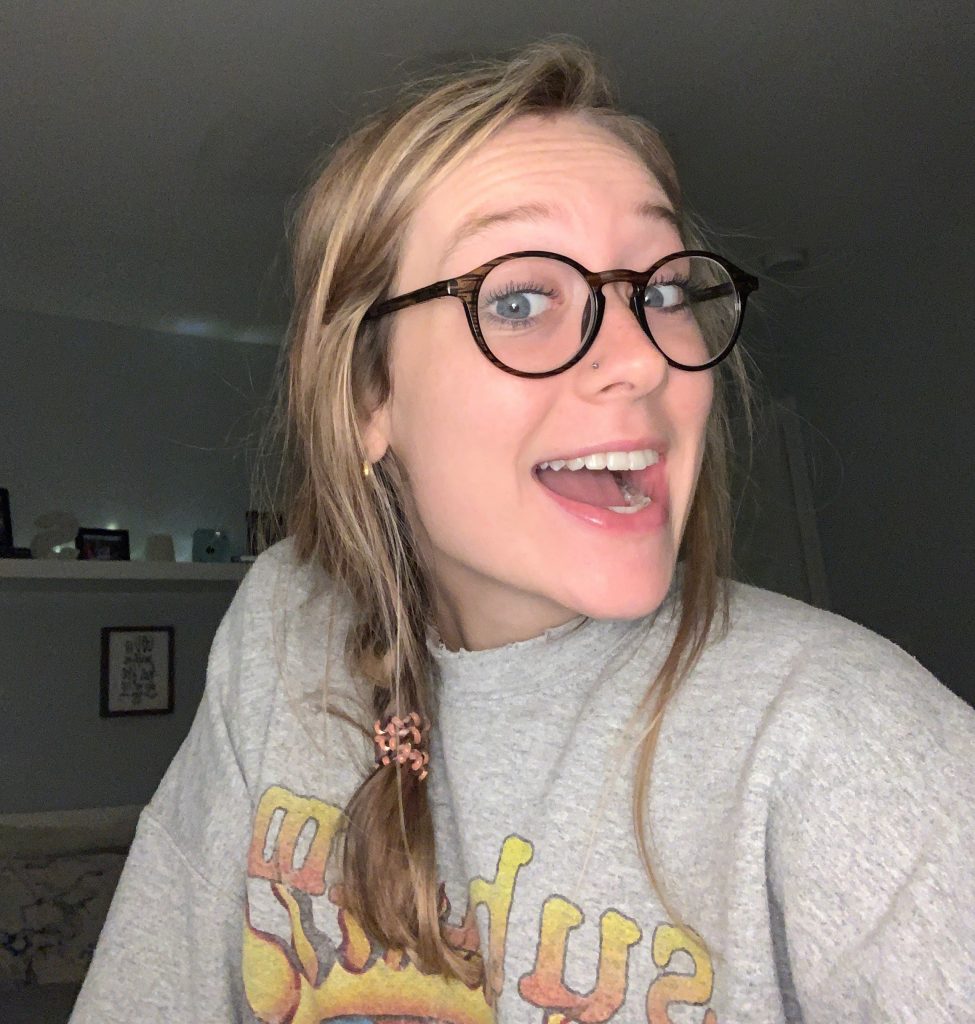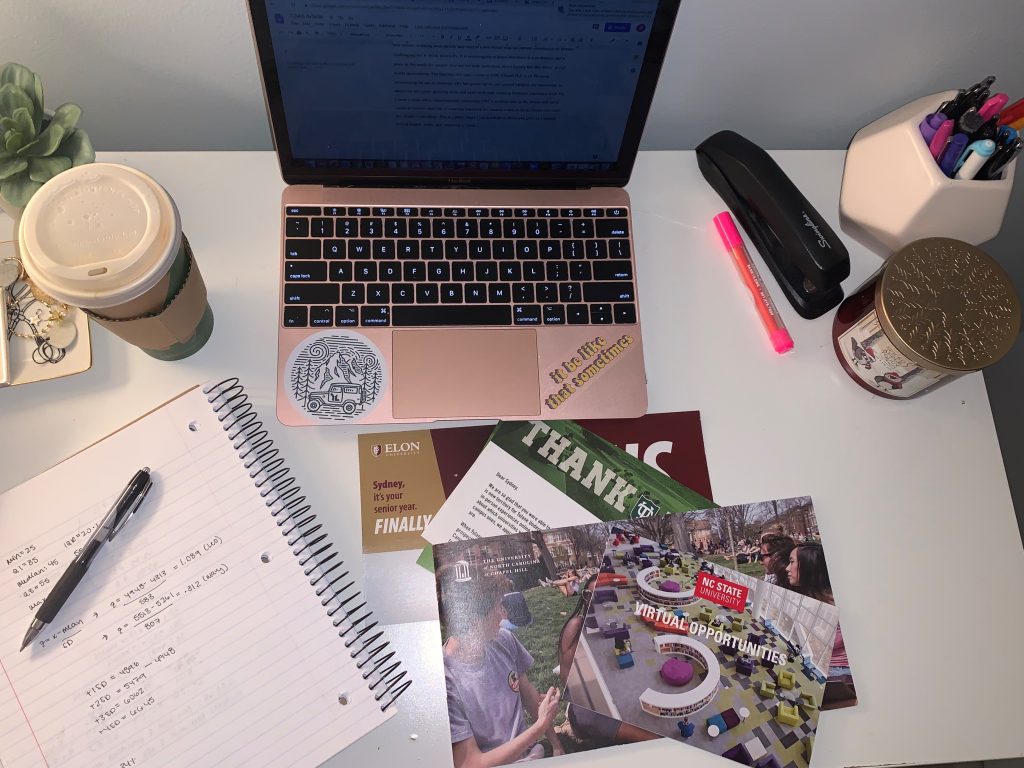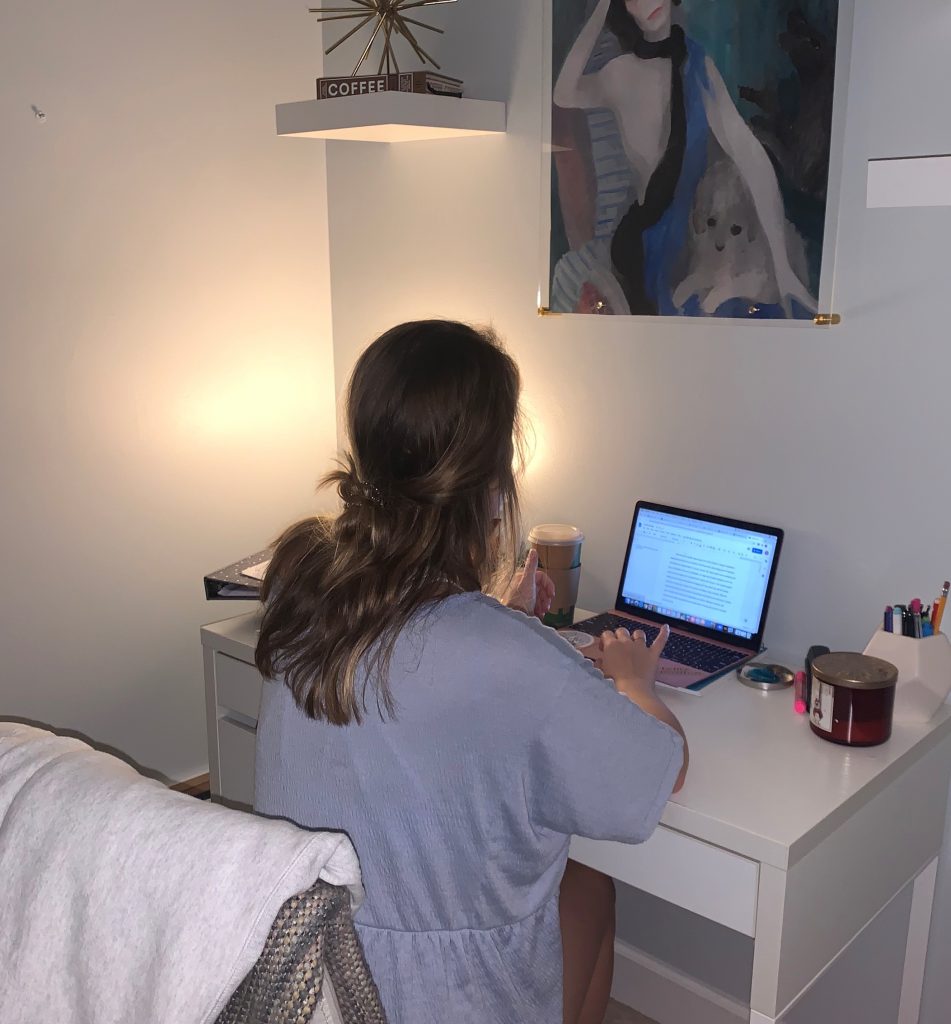“The Center for the Study of the American South has been the setting where I can clearly see the intersecting points between the past and the present, between scholarship and transforming ideas into action.”
Sydney Simpson-Vos, Jordan High School Senior (Durham Public Schools)

Much to our delight, during the Summer and Fall of 2020, Jordan High School senior Sydney Simpson-Vos has been creating communications materials as a volunteer with our Center staff. She is producing videos, learning graphic design skills, and exercising her own judgement to incorporate historical materials – all while enduring the challenges of COVID-19 quarantine, changing protocols for schools, and a period of social unrest. Sydney views the volatility and uncertainty of this time with the unique perspective of a high school student who is also a prospective college student. We wanted to know what that particular space was like. She calls it “in-between.”
A Time of Exploration and Transformation
An essay by Sydney Simpson-Vos
Over the last six months, like so many of us, I have existed in a strange “in-between”: adapting almost daily to new curveballs yet still faced with a discouraging sense of sameness. My friends and I consider March 13 our last “normal” day, where masks weren’t mandatory and hugs or handshakes were not yet unthinkable. As a high school student nearing the end of my junior year, the prospect of an “extended break” initially felt welcome. I was experiencing the feeling of burnout that can accompany the lagging end of the school year, and the looming uncertainty of applying to college in the summer was adding a layer of tension. When our extended break faded away into months of cancellations and isolation, the virtual end to a school year in Durham Public Schools was fragmented, even chaotic. Nothing was certain, and expectations of student accountability were tossed aside. It was easy for my days to lose their sense of purpose.
 After the first month, even the newness of life in quarantine lost its apocalyptic feel. I became too comfortable with my new monotonous routine; without much outside stimulation, my mind became dormant. Frankly, I was content with this headspace for a while, feeling like I finally had a moment to breathe. I broke up the monotony with daily Bean Traders coffee runs, listening to the latest true crime podcast while I drove, casually noting the lack of traffic and the sense of calm Durham’s streets had taken on. It didn’t take long for me to realize, however, that the world I thought had halted around me was still very much alive, and alive in ways that demanded my attention.
After the first month, even the newness of life in quarantine lost its apocalyptic feel. I became too comfortable with my new monotonous routine; without much outside stimulation, my mind became dormant. Frankly, I was content with this headspace for a while, feeling like I finally had a moment to breathe. I broke up the monotony with daily Bean Traders coffee runs, listening to the latest true crime podcast while I drove, casually noting the lack of traffic and the sense of calm Durham’s streets had taken on. It didn’t take long for me to realize, however, that the world I thought had halted around me was still very much alive, and alive in ways that demanded my attention.
Elsewhere in America, the streets were not calm. I watched disgusted as news coverage of George Floyd’s death was broadcast across the country, and felt helpless at first as I read story after story of yet another protest that had turned bloody at the hands of police brutality and provocation. As a young person who is passionate about activism and social justice, I was eager for the movement unfolding nationally to gain momentum in the Triangle. I have always felt lucky to live in a city like Durham, where it is clear that diversity and inclusion are celebrated. But this summer, I saw Durham and the many places around which I have grown up in a very new light. It was not adults that were at the forefront this time, leading the conversations about things that urgently mattered, but people my age. I was able to attend successfully organized student-led protests and workshops, watching Gen Z step forward boldly with a set of demands, advocating for the betterment of the spaces we occupy daily and for the spaces we will inevitably occupy in the future. When I think about empowerment today, this is the first thing that comes to mind. Finally, all of the moving pieces that made up my passion for activism started falling into place. I started to concretely see how complex issues could be combatted at the local level through a series of strategic steps, rooted first and foremost in a rich understanding of history and its underpinnings that are seen everywhere.
My ability to understand these developments was enriched immeasurably by the opportunity to begin an internship with The Center for the Study of the American South. For the first time, my scattered interests solidified and I could finally envision the ways I would like to see them pan out after high school. When people asked me what I wanted to study in college, I could now say with certainty and passion that I wanted to work towards a career in policy and politics. In many respects, this period of isolation and disruption of everyday routines has been the silver lining of a rather large dark cloud.
It is impossible for me to describe this silver lining without including my time at The Center. Getting to work alongside people with such unique ideas about how to showcase and highlight pertinent social issues has been extremely  refreshing. Not only have I been grateful to participate in conversations about how to best showcase the work of the Center to the larger UNC community, but I am so glad that historical perspectives are such a focal point in all of it. The Center for the Study of the American South has been the setting where I can clearly see the intersecting points between the past and the present, between scholarship and transforming ideas into action. Working with faculty and staff at Love House was the perfect counterpart in further challenging me to think abstractly. It is encouraging to know that there is a profession and a place in the world for people who are not only passionate about history but also about its real world applications. The fact that this space exists at UNC Chapel Hill is all the more encouraging for me as someone who has grown up on and around campus, my aspirations to attend the university growing more and more each year. Gaining firsthand experience with The Center’s work while simultaneously witnessing UNC’s students take to the streets and social media to vocalize their list of concerns regarding the campus’s own political climate has made me certain of one thing: This is a place where I can and want to thrive and grow as a learner, critical thinker, writer, and ultimately a human.
refreshing. Not only have I been grateful to participate in conversations about how to best showcase the work of the Center to the larger UNC community, but I am so glad that historical perspectives are such a focal point in all of it. The Center for the Study of the American South has been the setting where I can clearly see the intersecting points between the past and the present, between scholarship and transforming ideas into action. Working with faculty and staff at Love House was the perfect counterpart in further challenging me to think abstractly. It is encouraging to know that there is a profession and a place in the world for people who are not only passionate about history but also about its real world applications. The fact that this space exists at UNC Chapel Hill is all the more encouraging for me as someone who has grown up on and around campus, my aspirations to attend the university growing more and more each year. Gaining firsthand experience with The Center’s work while simultaneously witnessing UNC’s students take to the streets and social media to vocalize their list of concerns regarding the campus’s own political climate has made me certain of one thing: This is a place where I can and want to thrive and grow as a learner, critical thinker, writer, and ultimately a human.
